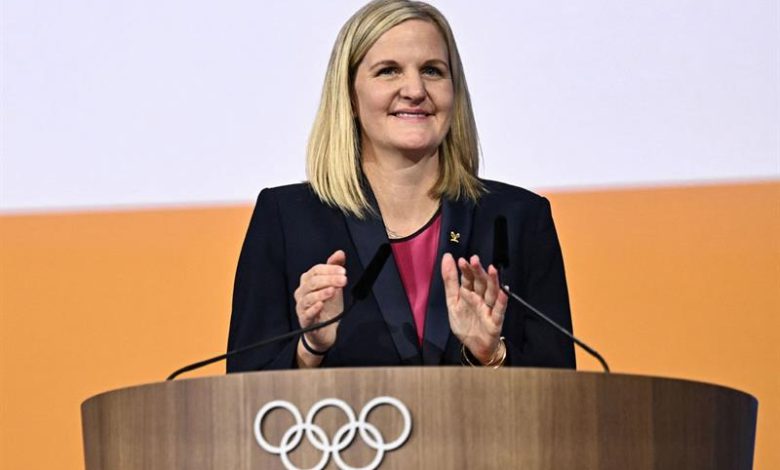Auburn legend Kirsty Coventry elected as IOC President

Auburn Legend Kirsty Coventry Elected as IOC President: A New Era for the International Olympic Committee
In an exciting and historic development for both the world of sport and Auburn University, Kirsty Coventry, an Olympic gold medalist and long-time advocate for athlete rights, has been elected as the President of the International Olympic Committee (IOC). This monumental achievement is not only a proud moment for Coventry herself, but it also marks a significant shift for the IOC, as she becomes one of the few women to ever hold the prestigious position.
Coventry’s path to becoming the leader of the IOC is a testament to her legacy in the world of sport, her unparalleled commitment to improving the athlete experience, and her deep understanding of the importance of Olympic values. Her election to the IOC presidency is a historic moment, as she becomes the first African woman to ever hold such an influential role in the global sporting landscape. For Auburn fans and alumni, this achievement further cements Coventry’s status as one of the most influential figures in both Auburn athletics and the world of international sports governance.
In this article, we will explore the significance of Kirsty Coventry’s election as IOC President, the legacy she leaves as an athlete and advocate, her plans for the future of the Olympic Games, and what this means for Auburn University and the world of sports at large.
Kirsty Coventry: From Auburn Athlete to IOC President
Before her election as IOC President, Coventry was widely known for her decorated career in swimming. Born in Harare, Zimbabwe, Coventry became a household name during her time at Auburn University, where she honed her skills as a swimmer. She later went on to dominate the swimming world, with an extraordinary collection of seven Olympic medals, including two golds, four silvers, and one bronze.
Coventry’s achievements at the 2004 Athens Olympics and 2008 Beijing Olympics were groundbreaking. She broke multiple world records and set numerous milestones for African athletes, inspiring generations of swimmers, particularly women from her native Zimbabwe and across the African continent. Her triumphs in the pool made her a role model not only for aspiring athletes but for anyone who strives to push beyond their limits. At Auburn, she left an indelible mark, cementing her place as one of the greatest collegiate swimmers in history.
During her time at Auburn University, Coventry won numerous NCAA titles and helped the Tigers build a powerhouse swimming program. Her work ethic, discipline, and drive made her a standout athlete on the global stage. But what truly set Coventry apart was her approach to using sport for social change. Her understanding of the athlete experience, coupled with her ability to leverage sport for positive social change, would lay the foundation for her leadership in the IOC.
After her competitive swimming career came to a close, Coventry transitioned into sports administration and governance. She was elected to the IOC Athletes’ Commission, where she advocated for better representation and rights for athletes. Through this role, she became a vocal advocate for gender equality, mental health awareness, and athlete safety, making a positive impact on the broader Olympic movement.
Her election to the role of IOC President was no accident; it is the culmination of a lifetime of advocacy, leadership, and commitment to improving the Olympic Games and the experience of athletes worldwide.
A Historic Election: Coventry’s Path to the IOC Presidency
Kirsty Coventry’s election to the presidency of the IOC is not just a significant moment for her personally but is a landmark achievement for women in sports. The IOC Presidency has historically been a male-dominated position, and Coventry’s rise to the top represents a breakthrough moment for gender equality in the sporting world.
In her campaign for the presidency, Coventry focused on themes of transparency, inclusivity, and modernization. She emphasized the need for the IOC to adapt to the modern world, engaging with a broader, younger audience while maintaining the core Olympic values. Her platform also centered on improving the relationship between athletes, the IOC, and the global sporting community, ensuring that the needs and voices of athletes are heard in the decision-making processes of the committee.
Coventry’s election victory is particularly significant because of her deep understanding of the challenges facing modern athletes. She has been a prominent advocate for athlete mental health, a topic that has gained increasing attention in recent years. As the IOC President, Coventry is expected to continue pushing for comprehensive mental health resources for athletes, as well as addressing issues such as doping, gender equity, and the commercialization of sport.
Her leadership style is rooted in her experience as an athlete, a coach, and an advocate, all of which have prepared her for the monumental task of overseeing the future of the Olympic Games.
What This Means for the Future of the Olympic Games
Kirsty Coventry’s election as IOC President signals the beginning of a new era for the Olympic Games. As an athlete who has experienced the challenges and pressures of Olympic competition firsthand, Coventry is uniquely positioned to guide the IOC in a direction that prioritizes athlete well-being and the integrity of the Games.
One of the key areas that Coventry is expected to focus on during her presidency is the modernization of the Olympic Games. With the ever-changing landscape of media, technology, and global communication, the IOC faces pressure to remain relevant in a rapidly evolving world. Coventry has expressed her commitment to embracing new technologies and digital platforms to make the Olympic Games more accessible to global audiences, especially younger generations who engage with sports in new and innovative ways.
In addition to technological innovation, Coventry is likely to push for reforms that promote sustainability within the Olympic movement. The environmental impact of hosting large-scale sporting events has been a growing concern, and Coventry’s leadership could steer the IOC toward more sustainable practices in organizing the Games. Her commitment to athlete-centric decision-making will also continue, ensuring that the needs and rights of athletes are protected, especially when it comes to health, safety, and fair competition.
Furthermore, Coventry’s presidency is expected to prioritize global inclusivity. She has a long track record of supporting athletes from diverse backgrounds and ensuring that opportunities are accessible to underrepresented groups in sport. This could translate into initiatives that expand participation in the Olympic Games for athletes from emerging nations, providing resources and support to those who may not have the same access to training and competition as athletes from more developed countries.
The Role of Auburn University in Coventry’s Legacy
As Auburn fans, it’s impossible to overlook the significant role the university played in shaping Kirsty Coventry’s career and values. Auburn not only helped her hone her skills as a swimmer but also fostered the leadership qualities that have made her such an influential figure in global sport.
During her time at Auburn, Coventry was mentored by the university’s swimming coaching staff, who supported her development as an athlete and as a leader. Under the guidance of coach David Marsh, who is widely regarded as one of the most accomplished coaches in collegiate swimming, Coventry flourished both as a swimmer and a team leader. She was a key part of Auburn’s success on the national stage, and her collegiate accomplishments laid the foundation for her future success as an international athlete.
Auburn University has long been proud of its reputation as a top-tier athletic program, and Kirsty Coventry’s election as IOC President only enhances the university’s legacy in the world of sports. Her leadership in the IOC is a reflection of the values instilled in her during her time as a Tiger—values such as discipline, perseverance, and a commitment to excellence.
Moreover, Coventry’s involvement in global sports governance will continue to raise Auburn’s profile in international circles, further enhancing the university’s standing as a leader in fostering athletic talent and leadership.
What’s Next for Kirsty Coventry and the IOC
As IOC President, Kirsty Coventry faces many challenges. From navigating the complexities of international sports governance to ensuring the sustainability and integrity of the Olympic Games, her tenure will likely be marked by bold leadership and an unwavering commitment to the Olympic movement.
One of her primary objectives will be to ensure that the Olympic Games continue to evolve in a way that reflects the changing needs of athletes and the global community. Her focus on inclusivity, transparency, and athlete rights will likely shape the decisions and initiatives she undertakes during her presidency. Moreover, she is expected to champion the importance of mental health resources and athlete advocacy, two issues that have gained significant attention in recent years.
Coventry’s work will also likely emphasize the importance of gender equity in sports, ensuring that the Olympic Games are accessible and equitable for athletes of all genders. Her ability to bring attention to these issues, combined with her experience as an athlete and administrator, will likely set a new precedent for future generations of Olympic leaders.









